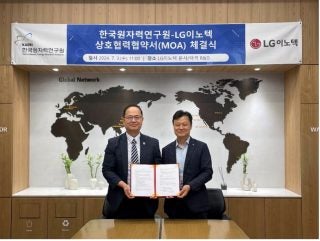
The Korea Atomic Energy Research Institute (KAERI) and South Korean electronic component manufacturing firm LG Innotek have signed a mutual cooperation agreement to cooperate in the development of thermoelectric technology for nuclear batteries used in the space and defence sectors.
Research to develop nuclear batteries as a stable energy source in space exploration is yielding results. However, it has the limitation of relying on imports for key component materials for batteries, KAERI noted. Now South Korea’s public and private sectors have joined forces to overcome these limitations.
Through this new agreement, the two organisations plan to strengthen their independent development capabilities for local production of thermoelectric elements, a key component of nuclear batteries. A thermoelectric element is a semiconductor that converts heat into electrical energy and consists of an insulating substrate made of ceramic, electrodes, and P-type and N-type thermoelectric materials.
A nuclear battery produces electricity by utilising the decay heat of radioactive isotopes and does not require an external power source. As a result, it can be a stable energy source even in space environments with extremely low and high temperatures. KAERI first succeeded in developing a nuclear battery in 2022, and is now making efforts to enhance its performance. However, 100% of the thermoelectric materials used are imported. To securing independent space exploration technology in the future, dependence on imports of key components is an issue that must be resolved, KAERI said.
Accordingly, KAERI and LG Innotek will cooperate in developing design, processing, and evaluation technologies for thermoelectric elements for nuclear cells. They will design, synthesise, and process thermoelectric materials for thermoelectric elements, and will begin to localise thermoelectric elements. KAERI will focus on developing high-output thermoelectric device technology. LG Innotek, which has expertise in manufacturing and selling thermoelectric materials, plans to focus on developing high-efficiency energy conversion thermoelectric materials and to establish a domestic supply chain.
Researcher Jeong Young-wook, head of KAERI’s Hanaro Quantum Science Institute, said, “In the era of new space, we will actively cooperate with private companies to secure core nuclear battery technology at an early stage.” He added, “We will contribute to helping Korea lead international space development cooperation.”






